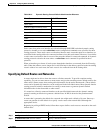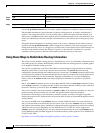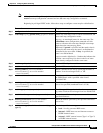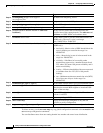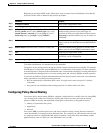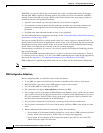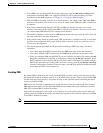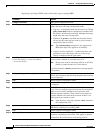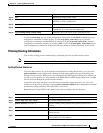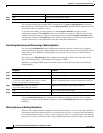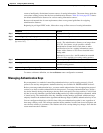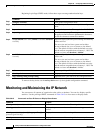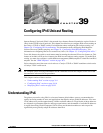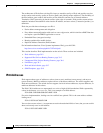
38-87
Catalyst 3750-E and 3560-E Switch Software Configuration Guide
OL-9775-02
Chapter 38 Configuring IP Unicast Routing
Configuring Protocol-Independent Features
Use the no route-map map-tag global configuration command or the no match or no set route-map
configuration commands to delete an entry. Use the no ip policy route-map map-tag interface
configuration command to disable PBR on an interface. Use the no ip route-cache policy interface
configuration command to disable fast-switching PBR. Use the no ip local policy route-map map-tag
global configuration command to disable policy-based routing on packets originating on the switch.
Filtering Routing Information
You can filter routing protocol information by performing the tasks described in this section.
Note When routes are redistributed between OSPF processes, no OSPF metrics are preserved.
Setting Passive Interfaces
To prevent other routers on a local network from dynamically learning about routes, you can use the
passive-interface router configuration command to keep routing update messages from being sent
through a router interface. When you use this command in the OSPF protocol, the interface address you
specify as passive appears as a stub network in the OSPF domain. OSPF routing information is neither
sent nor received through the specified router interface.
In networks with many interfaces, to avoid having to manually set them as passive, you can set all
interfaces to be passive by default by using the passive-interface default router configuration command
and manually setting interfaces where adjacencies are desired.
Beginning in privileged EXEC mode, follow these steps to configure passive interfaces:
Step 11
end Return to privileged EXEC mode.
Step 12
show route-map [map-name] (Optional) Display all route maps configured or only the one
specified to verify configuration.
Step 13
show ip policy (Optional) Display policy route maps attached to interfaces.
Step 14
show ip local policy (Optional) Display whether or not local policy routing is
enabled and, if so, the route map being used.
Step 15
copy running-config startup-config (Optional) Save your entries in the configuration file.
Command Purpose
Command Purpose
Step 1
configure terminal Enter global configuration mode.
Step 2
router {bgp | rip | ospf | eigrp} Enter router configuration mode.
Step 3
passive-interface interface-id Suppress sending routing updates through the specified Layer 3
interface.
Step 4
passive-interface default (Optional) Set all interfaces as passive by default.
Step 5
no passive-interface interface type (Optional) Activate only those interfaces that need to have
adjacencies sent.
Step 6
network network-address (Optional) Specify the list of networks for the routing process. The
network-address is an IP address.



